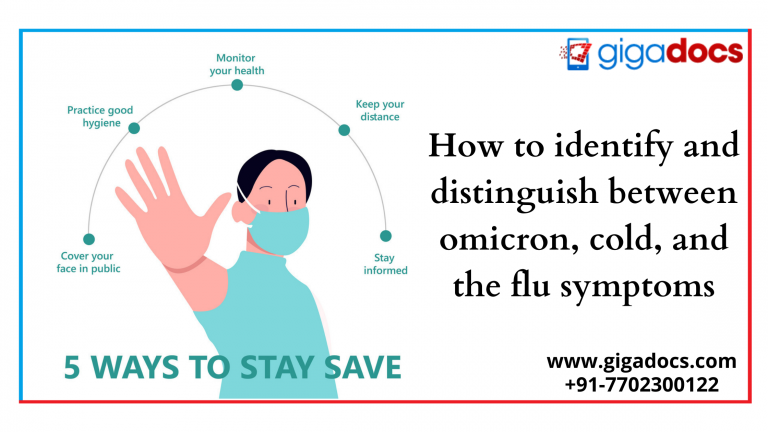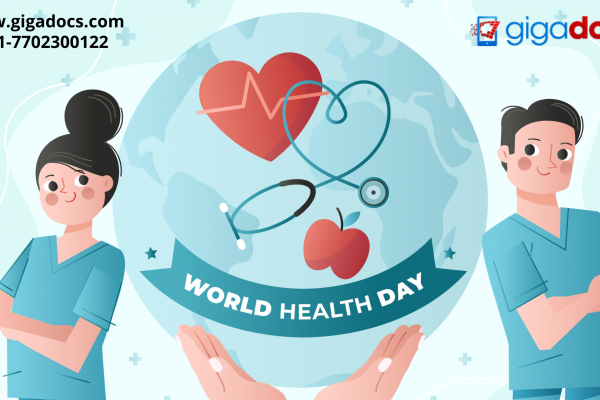With the spike of omicron cases across the country, many people may be wondering how to spot the difference between COVID-19 symptoms and those of a winter common cold or flu. According to preliminary research, cold symptoms are milder than COVID-19 or flu symptoms, with a cough, runny nose, and sneezing being more common. However, breakthrough cases of COVID-19 in vaccinated adults, particularly omicron, are similar to cold-like symptoms- such as fever, runny nose, sore throat, coughing, and overall exhaustion. Here is a catch- COVID-19 is identified by a loss of smell and taste sensation, which is not common in ordinary cold viruses.
Unlike earlier worrying strains like delta, omicron has a stronger affinity for the upper respiratory epithelium. People are more likely to wheeze, sneeze, or get a congested airway as a result of the Omnicron strain.
It is, thus, essential to get tested if you suspect you have Covid. Even those who don’t feel sick may have become asymptomatically positive and pose a risk to others around.
How Long is a Person Contagious after Coronavirus Exposure?
If you have been exposed to the coronavirus that causes COVID-19, you are at risk. When will you be able to tell whether you caught the deadly virus? The answer lies in the incubation period.
Viruses are continually changing, which might result in the emergence of new strains known as “variants.” COVID-19 variations can have varying incubation lengths. Let’s discuss them in detail-
According to the researchers, Covid symptoms show up in newly infected people roughly 5.6 days after contact. Symptoms could emerge as quickly as two days after exposure in some cases. By day 12, the symptoms are predominant. In rare instances, the covid symptoms may appear after a fortnight. This happens in one out of 100 cases.
Incubation Period for the Delta Variant
The Delta strain has a shorter incubation period than previous SARS-CoV-2 variants which includes the alpha, beta, and gamma variants. Delta’s incubation period is approximately four days, which means if the Delta variant infects, you will start showing symptoms within four days.
Incubation Period for the Omicron Variant
The WHO has labeled the Omicron strain as a variant of concern; its incubation time may be shorter than earlier variants, with symptoms showing up within three days after contact in newly infected patients. According to preliminary research, Omicron may be more contagious than the Delta variant, which caused havoc in India during the second wave. However, scientists are currently researching how sick it can make individuals and how well vaccines work against it.
When Does the Coronavirus Spread the Most?
Researchers believe that people infected with the coronavirus can spread it to others two to three days before symptoms develop and are most contagious one to two days before they feel ill.
As discussed earlier, if you have the Omicron variant, you may become contagious more quickly given the short incubation time, particularly of the Omnicron variant.
How do Covid Vaccinations help?
When you receive a COVID-19 vaccine, your immune system gets trained to recognize the virus as a foreign entrant and is programmed to attack it. COVID-19 vaccinations have been shown in studies to reduce your risk of becoming infected with the virus significantly. However, if you get it after being vaccinated, the vaccination will still keep you from being extremely ill or needing hospitalization.
Consulting a specialist with Gigadocs
While we are all enjoying the holiday season and the new year is just around the corner, we must never forget the rules of social distancing, using sanitizer, and facemasks. While it’s advisable to avoid crowds, still, if you decide to venture out, don’t throw your guard off; use facemasks and sanitizers that act as shields against the deadly coronavirus.
For any instances of cold, flu book an initial consultation on the Gigadocs app and avail yourself of a teleconsultation with the best doctors around you from the safety of your home. Book a health care appointment to consult for any chronic and non-chronic diseases, only on the Gigadocs app.
Download the Gigadocs app to book your consultation-
IOS App – apple.co/2W2iG4V
Android App – bit.ly/33AQoRC




